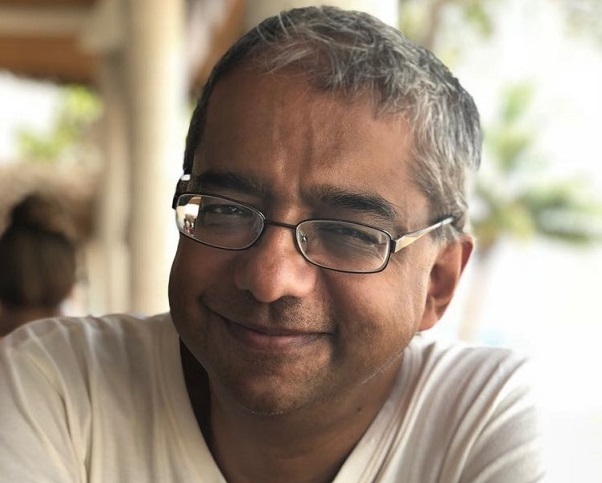By Jekhan Aruliah
Interviewing Dr Rajendran Surenthirakumaran (Suren), the newly appointed in September 2021 Dean (Head) of the Faculty of Medicine University of Jaffna, I realised the vital importance of international outreach. International collaboration for expertise, experience, research, and for funding is as key to academia as it is for business.
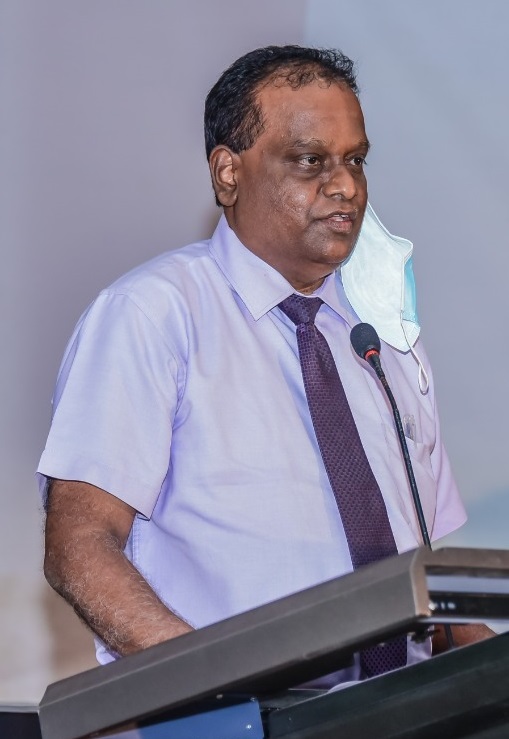
I am impressed how Suren has leveraged this through his network of colleagues and friends extending widely into the Diaspora. He has built academic relationships with Birmingham University and Bristol University both in the United Kingdom; His projects have received funding from the Wellcome Trust, Roche Global and from the UK’s National Institute of Health Research (NIHR) and National Health Service (NHS); His team in Jaffna is working with teams in Brazil and China researching into Atrial Fibrillation (a heart condition). Suren is Chairman of CANE (Cancer control North East), supported by the UK charity CANE UK. Through CANE he has been developing a Palliative Care (including pain management) service, supported by funding from the Canadian charity Two World Cancer Collaboration (TWCC) and the International Medical Health Organisation (IMHO) based in the USA and Canada.
A great example of the fruit of this kind of support, TWCC and IMHO allowed Suren together with the Northern Province Department of Health to introduce a mobile palliative care service, taking pain management to people in their homes. Palliative Care is a vital service often but not only for ‘end of life’. Previously available to those who could make the trip climbing onto a public bus to and from their local hospital.
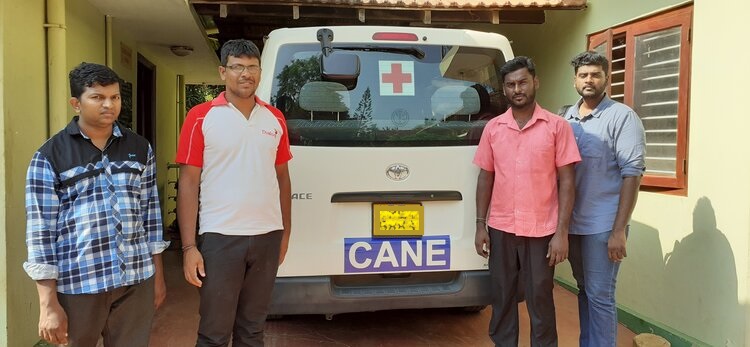
Away from Jaffna University’s Faculty of Medicine, where he is now the Dean, Suren works extensively with the smaller regional hospitals. He is the Honorary Medical Advisor at the Moolai Cooperative Hospital, where he himself was born in 1973. He is the founding head of the Institute of Medical Sciences (IMS) at the Manipay Green Memorial Hospital, which he conceived in 2011 together with Diaspora support when he was spending a year of postdoctoral training at London’s prestigious St Bartholomew’s Hospital (Barts). IMS’s prime objective is to provide educational programs, including professional pre-service and in-service training in areas of medical sciences. IMS also provides healthcare services, and It participates in career guidance for young people to encourage them into what remains an unfashionable profession in any role other than doctor.
As well as his work in the medical field, Suren devotes a great deal of his time working for the community beyond medicine. He is the Head of the Jaffna Management Committee of the World Health Organisation (WHO) funded “Jaffna Healthy City”, part of the WHO Healthy Cities Network. This WHO initiative attempts to engage “local governments in health development through a process of political commitment, institutional change, capacity-building, partnership-based planning and innovative projects”. He is the Research Coordinator for a project funded by the World Bank’s AHEAD programme developing a multi-stakeholder approach for water security in the Northern Province. Suren has engaged a team of mainly young people working on strategies and implementing initiatives in garbage management, recycling, healthy food, and physical activity.
Current Issues
I asked Dr Surenthirakumar what he sees as the key issues he has to grapple with in his new role as Dean.
The Faculty of Medicine struggles to attract the brightest young doctors to join as academics. Medical doctors have many opportunities for high pay, migration to other parts of Sri Lanka, and emigration to other parts of the World. Sri Lankan University Medical Faculties fall into the payscale of the Ministry of Higher Education, which during early career is lower than the Ministry of Health pays for doctors in government hospitals.
R&D investment in Sri Lanka is inadequate. Figures from the Ministry of Finance show the Government of Sri Lanka in 2020 allocated less than 0.2% of GDP for research and development. This puts Sri Lanka near the bottom for R&D investment internationally, according to data by the United Nations UNESCO.
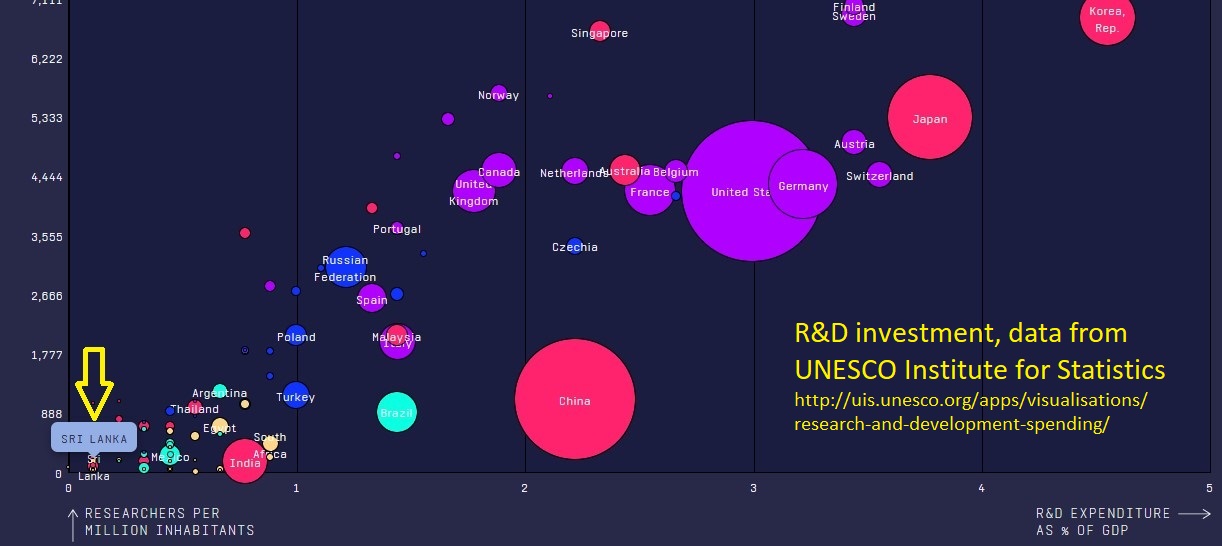
Some other Sri Lankan universities, including Colombo and Moratuwa, have seen success getting funding from private individuals, foundations, trusts funds and NGOs as well as government departments. They have also worked with the private sector entering into Public Private Partnerships (PPP) to jointly develop products and services. Jaffna University needs to learn to find more private engagements and endowments like these. Jaffna University needs to pursue these avenues more effectively, so it can become a leading R&D centre.
In particular Jaffna University should develop University Business Linkages (UBL). Linking universities with businesses brings great mutual benefit. The businesses gain access to a highly focused resource capable of research according to the scientific method. The university, in particular the younger academics and students, gain valuable experience of the practical realities of creating goods and services that generate profits and self sustainability without relying on grants and handouts.
The university needs to modernize its curriculum. Jaffna University has allowed the curriculum to fall behind due to lack of funds to invest in modern equipment and other resources. Also due to a lack of new blood bringing new experiences and ideas. The university should form more links with foreign institutions so academics can go on secondment bringing back new experiences and new ideas. Other Sri Lankan universities have connected with some of the top overseas establishments. Opportunities to gain overseas exposure like this would also attract bright young academics to join the Jaffna faculty.
There can be more collaboration between the university’s own faculties. Already in a collaboration with Jaffna University's Engineering Faculty at the new Killinochchi Campus methods are being developed for using 3D Printers to produce surgical implants including artificial heart valves, joints and limbs. A "digital health" project, another collaboration between the Medical and Engineering faculties, enables people to do a basic early warning ECG (heart check) with their mobile phones. This can get them into hospital sooner for a full checkup. Remote monitoring of people in home quarantine is being developed, highly relevant in this era of pandemics.
Very little time is allocated for the academic staff to do research, they are largely timetabled for teaching. This should change. The academic staff need to be trained in how to apply for research grants, including those available from other nations including the USA and UK. They need to produce more research papers. The fame and reputation of a university is built on its research.
The Power of the Diaspora
Suren again emphasised the power of the Diaspora to support the university. The University of Birmingham’s grant to the Faculty of Medicine funds four research fellows, a team of twenty five data collectors, and the running costs of a centre. The Department of Surgery’s Orthopaedic Unit has benefitted over the years from Singaporean Tamil well wishers, and grants from Singapore’s Lee Foundation.
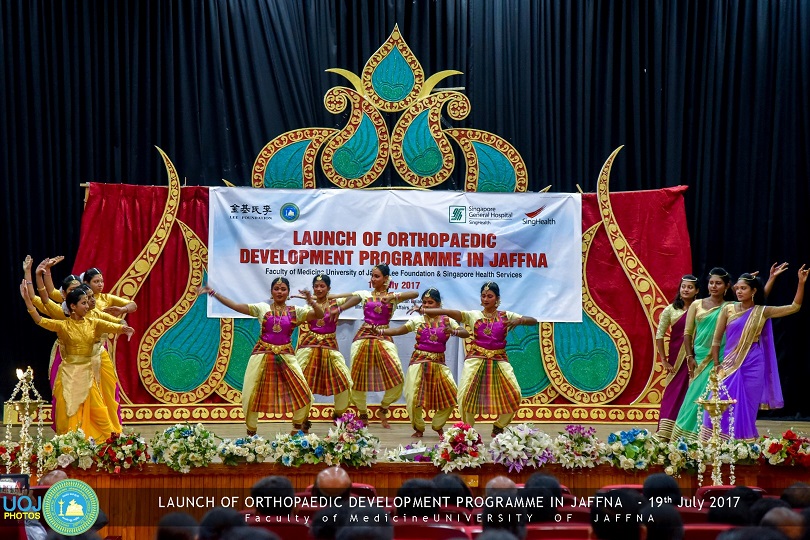
The A.S.Thambaiya Endowment for Research in Oncology, is a donation by Mr T.Yogeswaran in Malaysia in memory of his father. This funds a professorial chair for cancer research.
Toronto University's Practicum (work placement) programme has provided opportunities for both volunteer and paid individuals to come to the Northern Province. Second generation Tamil Diaspora, with little knowledge of their ancestral home, can use these placements to reconnect. These overseas institutions often have Sri Lankan Tamils in senior positions who understand the needs and opportunities in the Northern Province to create this links.
Dr Surenthirakumaran commented that the Diaspora can do more to create opportunities for the people to become self reliant. Good training, good jobs, good opportunities are more valuable than free money deepening the sense of passive de-energising helplessness. That is one of the great chronic issues in the Northern Province, affecting physical, mental and social health in the North.
You can contact Dr. Surenthirakumaran at surenthirakumaran@gmail.com
( — The writer Jekhan Aruliah was born in Sri Lanka and moved with his family to the UK when he was two years of age. Brought up in London, he graduated from Cambridge University in 1986 with a degree in Natural Sciences. Jekhan then spent over two decades in the IT industry, for half of which he was managing offshore software development for British companies in Colombo and in Gurgaon (India). In 2015 Jekhan decided to move to Jaffna where he is now involved in social and economic projects. He can be contacted at jekhanaruliah@gmail.com — )

